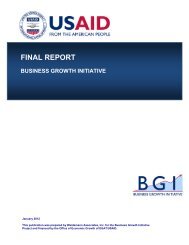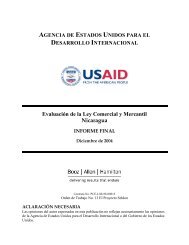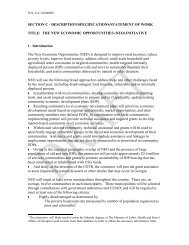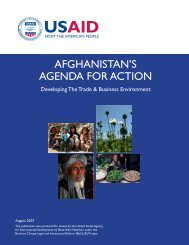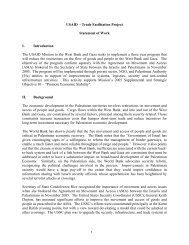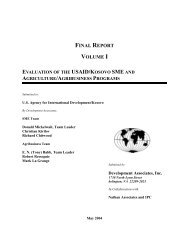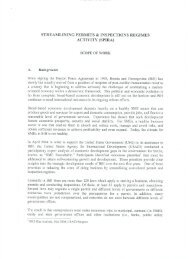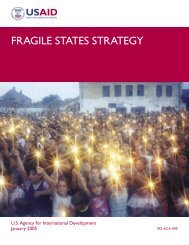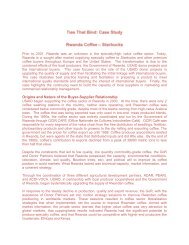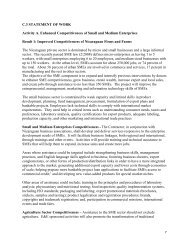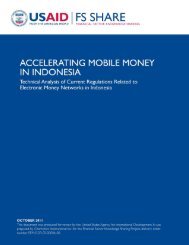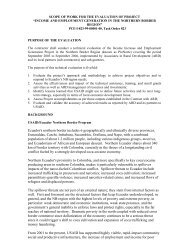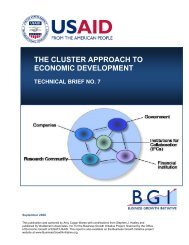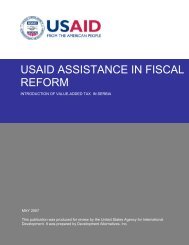Trade and Commercial Law Assessment - Honduras - Economic ...
Trade and Commercial Law Assessment - Honduras - Economic ...
Trade and Commercial Law Assessment - Honduras - Economic ...
Create successful ePaper yourself
Turn your PDF publications into a flip-book with our unique Google optimized e-Paper software.
TRADE AND COMMERCIAL LAW ASSESSMENT DECEMBER 2004HONDURAScan be taken to re-establish public confidence. Necessary reforms include prosecutingcorruption <strong>and</strong> reconsidering the issue of separation of powers, in particular the methodof appointing judges; educating attorneys, law students, <strong>and</strong> the business community incommercial law topics <strong>and</strong> the benefits of alternative dispute resolution (ADR); updatingthe <strong>Commercial</strong> Code, including incorporation of oral proceedings; <strong>and</strong> reviewing thenotary practice to ensure that the licensing of notaries is impartial <strong>and</strong> ethical.♦♦♦♦Bankruptcy. Although <strong>Honduras</strong> has a well-drafted, detailed insolvency law, which waspromulgated as part of its <strong>Commercial</strong> Code in 1950, the country has virtually nobankruptcy practice. Typically, businesses in <strong>Honduras</strong> carry out de facto insolvencyproceedings by simply shutting their doors <strong>and</strong> ceasing to exist. One of the major reasonsfor this lack of a formal bankruptcy practice is that insolvency proceedings fall to<strong>Honduras</strong>’s all-purpose trial courts, which may not have the capability to h<strong>and</strong>le complexbankruptcy cases. These courts have no experience with insolvency proceedings. Withrespect to banks, the failure of certain institutions in recent years has resulted in morecareful scrutiny <strong>and</strong> control by the Commission for Banking <strong>and</strong> Insurance. Banks do notnow fall under insolvency laws.Competition <strong>Law</strong> <strong>and</strong> Policy. Recognizing the benefits of a competition law <strong>and</strong> policy,the Government of <strong>Honduras</strong> has engaged in significant efforts to adopt a competitionlaw. Substantial initial efforts began in 2001, with renewed interest <strong>and</strong> activity in 2003.The well-publicized anticompetitive practices in the cement sector in 2004, combinedwith pressures created by the preparations for CAFTA <strong>and</strong> related internal <strong>and</strong> externalconcern about the lack of a competition law, have all driven forward the process ofadopting a competition law. In September 2004 a draft competition law was “officiated,”i.e., submitted to the <strong>Economic</strong>s Committee of the Legislative Assembly, where itremained as of December 2004.International <strong>Trade</strong>. Many steps remain before <strong>Honduras</strong> will have a complete legal <strong>and</strong>administrative structure for its international trade. To date, <strong>Honduras</strong>’s foreign tradeconcerns have focused on promoting <strong>and</strong> facilitating export operations to the relativeexclusion of import controls other than simple tariffs. <strong>Honduras</strong> has enjoyed GeneralizedSystem of Preferences (GSP) privileges in industrialized markets for which it did nothave to reciprocate by opening its borders. At these conditions change, necessaryimprovements will include (a) encouraging the growth of cooperation between the private<strong>and</strong> public sectors; (b) encouraging <strong>and</strong> supporting increased efficiency <strong>and</strong> transparencyin Customs administration <strong>and</strong> operations; (c) addressing the lack of a national legalframework for international trade, perhaps first through internal administration <strong>and</strong>development of procedures for applying countervailing duties; <strong>and</strong> (d) engaging infurther regionalization of <strong>Honduras</strong>’s international trade practices <strong>and</strong> structures.Flow of Goods <strong>and</strong> Services. Notwithst<strong>and</strong>ing certain recent improvements, trade-relatedinstitutions in <strong>Honduras</strong> still encumber traders with unnecessary transaction costs throughdelays <strong>and</strong> administrative burdens. By eliminating unwarranted <strong>and</strong> onerous constraintsembodied in laws, regulations, <strong>and</strong> procedures, <strong>Honduras</strong> can capture greater savings <strong>and</strong>efficiencies. In fact, improving the trade facilitation environment could reduce trade costsby as much as 15 percent of the value of traded goods. Even in <strong>Honduras</strong>’s relativelyI-7



